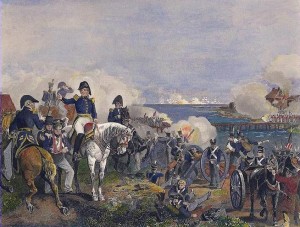Family history and the Battle of Plattsburgh
Two hundred years ago, when the weight of the British Empire’s armies swept south from Canada into the United States, four of my ancestors fought to throw them back. Three took up arms in the Battle of Plattsburgh. A fourth, Captain Aaron White of the NY 164th, gave his life in a skirmish with red coats at the Battle of Black Rock in western New York, as part of a failed effort to defend the city of Buffalo.
This old, deep connection to the North Country and the history of New York comes as a surprise. I moved to Saranac Lake sixteen years ago, with no suspicion that I had roots in this part of the country. I thought of my family as Western and Midwestern. But it turns out my people followed a pattern of migration that took us across New England and Vermont and included a pivotal chapter in New York in the early 1800s.
This blood-tie to our region’s history was uncovered by my mom, Elaine Sunde, an avid genealogist and president of the Midwest Historical and Genealogical Society in Wichita, Kansas, the city where I was born. Most summers, Mom — sorry, I just can’t call her Elaine or Mrs. Sunde — makes a trip here to the North Country to trek through old graveyards and scour county records offices in places like Fort Covington, Philadelphia, Malone and Elizabethtown.
“Research on the War of 1812 is beastly difficult because the records are so poorly kept,” she told me recently, when we got to talking about the upcoming Battle of Plattsburgh commemoration. “Records for the Revolutionary War were much better kept, so you have to pick this stuff up in bits and pieces where-ever you can find it.”
Digging through old records, Mom found that three of our ancestors fought in Plattsburgh in September of 1814. One, a militia officer named Joseph Skinner, lived in Elizabethtown where he ran an inn and tavern. Beginning in 1809, the Governor of New York began to establish arsenals at Elizabethtown and Plattsburgh, anticipating an invasion. As a militia major Joseph Skinner was assigned to secure the two arsenals. When the British invasion was imminent, he rushed north and joined the battle as a member of the Clinton County militia.
His 14 year old son, St. John Skinner, also fought bravely in the fray as part of Aiken’s Volunteers, a squad of academy students who took up arms. According to Mom’s research, “They were considered to be the heroes of the battle,” she says of St. John and his comrades. “They were recognized as having been major players because of their willingness to step forward. Later, they were recognized by Congress as having performed with great gallantry.” It’s hard to imagine this ancestor — a kid four years younger than my own son — taking up arms to stand against the greatest military power on earth.
In 1835, St. John Skinner spoke to the Plattsburgh Lyceum, detailing his father’s adventures in the battle. By his account, Major Joseph Skinner was seized near the river by three British soldiers. He was robbed of his horse, sword, and money, then clubbed with the butt end of a musket. As they carried him away as a captive, a party of Essex militia gave chase and fired. The British soldiers were killed, pulling Skinner into the water with them. When Skinner managed to stand, he was still in the line of fire. Just in time, one of his rescuers recognized him as a fellow member of the Essex Masonic Lodge.
Joseph Skinner was my third great uncle; St. John, my cousin. A third relative, also a great-great-great-uncle named Lemuel Warren is mentioned in contemporary accounts as having taken part in the battle at Plattsburgh. A private in the 4th regiment of Peck’s Vermont militia, he was one of some 2500 Vermont volunteers that crossed the lake to help defend Plattsburgh. A young man and former school teacher, “he apparently did not significantly distinguish himself,” Mom said, though again sparse record-keeping makes it difficult to know.
My fourth War of 1812 ancestor, Aaron White, was my great-great-great-great grandfather. A captain, he fought unsuccessfully to try to prevent the British from reaching Buffalo in December of 1813. The New York militia met the British and native warriors along the Niagara River. Most militiamen ran but my grandfather did not. He died on the 29th of December and the British pushed on to sack and burn Buffalo.
“I wish that I knew more about the battle of Black Rock,” Mom says. “I wish I had a little better picture of how it happened that he was one of the few killed, while so many other American soldiers managed to make their getaway. I choose to think that he was maybe more heroic.”
I like that idea, too, but I mostly love the happy accident that our family was involved at all, that our ties to the North Country and Upstate New York run so far back into the dust and mud and, yes, even the blood of our shared history.
Tags: champlain valley, history






.jpg)


The Final Invasion by Colonel David Fitz-Enz includes a detailed account of the squad of boys, aged 12 to 15, who
successfully held a bridge in Plattsburgh against British troops.
http://www.amazon.com/The-Final-Invasion-Plattsburgh-Decisive/dp/0803227949
Congratulations on the discovery Brian. My own GG Grandfather fought in the VT militia during the War of 1812. His service ended before the Battle of Plattsburgh however he was involved in earlier battles along the St. Lawrence including the Battle at Chrysler’s Farm. Genealogy puts a personal edge on history and makes it come alive.
Great stuff to discover. Fascinating that you have journeyed so far to return home